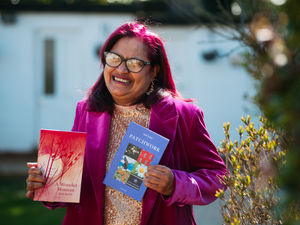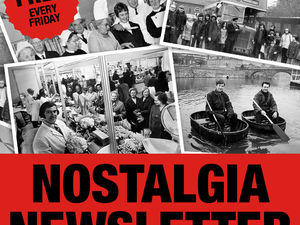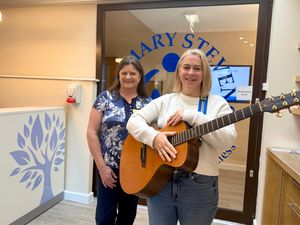Wolverhampton's Poet Laureate talks about the power of poetry and helping others to find their voice
As a young girl Kuli Kohli wanted nothing more than to be heard. Born with mild cerebral palsy, she struggled to express herself through speech.

One day her teacher allowed her to use her primary school’s electric typewriter and she began letting out her inner thoughts on paper.
It would be the start of a lifelong love of writing which would lead to Kuli being named as a Poet Laureate for Wolverhampton and awarded an honorary doctorate by the University of Wolverhampton.
Along the way the published poet has continued to be an advocate for people with disabilities and has helped others to find their voice through the power of words.
“With cerebral palsy, I was really shy at school and I didn’t want to talk to anybody because I couldn’t get my words out right,” explains Kuli.
“People used to say to me: why don’t you speak? I wanted to speak like everybody else but it was very difficult for me.
“I went to Penn Hall School and there was a typewriter but it wasn’t for me – they wanted me to learn to handwrite. I kept requesting to use the typewriter and, in the end, they said yes.
“From that day, all of my feelings, all of my tensions, all of my emotions, came out through my fingers,” explains Kuli, who was born in north India and moved to the Wolverhampton when she was two years old.
As a teenager, she continued to write, only daring to show a handful of people her work. Pouring her feelings out on paper became a much-needed means of escape for Kuli who desperately wanted people to understand what it was like to be in her shoes.
“I liked Indian films and Bollywood films, that inspired me to want to be like one of the Bollywood stars. I wanted to do that but my disability wasn’t shown on TV.
“I felt like I was drowning but nobody was listening and no one wanted to hear my voice,” explains mother-of-three Kuli.
After leaving school, she began working at Wolverhampton City Council, later becoming a Welfare Rights support worker.
When she was 18, Kuli began writing a novel, Dangerous Games, about living with cerebral palsy in an Asian household in Britain, which was inspired by her own experiences.
“I used to write in my diary every day. It was a secret, nobody could see my diary and even if they tried to read it, they couldn’t because my handwriting was really bad. I was writing the novel on and off for about 15 years. When my dad passed away I thought I must complete it. I had this finished novel in my hands and I thought: what do I do with it now? I was so confused,” says Kuli.
After receiving guidance from published poet and writer, Jeff Phelps, she met Simon Fletcher, the literature development officer at Wolverhampton libraries.
Simon, who runs Offa’s Press, which is dedicated to publishing and promoting contemporary West Midland poetry, encouraged her to attend his Blakenhall Writers’ Group.
“There I produced the first poem that I could say was a proper poem. I showed it to Simon and he was gobsmacked. He said from that day he was going to mentor me. He said: ‘You must read Kuli, that’s the most important thing’,” she tells Weekend.
“I started reading for half an hour every night and he gave me tasks to do which I completed within the time limits he gave me.”
Kuli, who also received advice from Colin Hambrook at Disability Arts Online, self-published her first collection of poetry and prose, Rag Doll, in 2014.
“I write about anything that inspires me, about my life and the way I see life. I enjoy creating something that other people can relate to. When a poem leaves your heart and is on the paper, it doesn’t belong to you any more. It belongs to the public and anybody who reads it,” she says.
Rag Doll proved hugely popular with copies selling out and Kuli receiving positive feedback. “Simon said to me: ‘You’re showing that people are interested in what you are trying to say’. He asked if I wanted to be published by Offa’s Press and I said ‘yes please’!”
Her first poetry pamphlet with Offa’s Press, Patchwork, was published in 2016. Simon, a published poet and writer, also encouraged her to face her fears by getting up on stage to perform her poetry.
“I couldn’t perform my poetry in front of people. I was so scared of how people would react to me and how I would speak to them.
“I was getting my friends to read my poetry rather than me. Everybody said: ‘Kuli, you should read your own poetry’. Simon said: ‘Kuli you need to show the audience that you have a voice and you can speak’.
“Simon organised an event just for me. He asked me lots of questions in front of the audience. I was very nervous but I did it. I read one of my poems and as I did everybody was so quiet. And there was a big applause at the end. It really lifted me up and gave me more confidence in myself.”
A performance at the Festival of Imagination and interview with the BBC, which has been viewed more than a million times, shone a global spotlight on her work.
“People all over the world were ordering Patchwork. I thought, this can’t be happening. It was so amazing and so inspiring that I could do that.”
The Punjabi Women’s Writing Group was set up in 2018 to encourage Punjabi women in Wolverhampton to share their stories.
“Getting Punjabi women out of the house and getting them to write was really hard. They had families and extended families that came first.
“Slowly it started to grow. The women write about the little things that make them happy, make them sad, the things that are important to them. It’s their own stories, in their own words. The results were amazing,” explains Kuli.
“I want poetry not to be something to be scared of. If you can write down what you feel, what you see, what you observe then you can write poetry. It’s a good way to lift yourself up, writing about something that means something to you.”
The group has had many successful writing workshops and local performances in Wolverhampton and Ironbridge that have sparked a lot of interest.
In 2021, Kuli suffered a stroke which meant she had to leave the job she loved at the council. “I loved my work, I loved getting out of the house and doing things for the public. It really broke my heart that I had to leave my job.”
During the same year her first full poetry collection, A Wonder Woman, was published by Offa’s Press, to great acclaim. “I never thought I would become so popular,” said Kuli.
She was wondering what to do next when Wolverhampton’s first Poet Laureate, Emma Purshouse, suggested Kuli applied to become her successor.
Poet Laureate is a two-year honorary position that encourages and raises the profile of poetry and the city.
At first Kuli dismissed the idea, believing she didn’t stand a chance of being chosen, but eventually she decided to apply anyway.
Still feeling certain nothing would come from it, she submitted her poem An Interpretation of Wolverhampton, which won the Wolverhampton Archives Poetry competition in 2011.
“I never thought anything about it again until I had an email saying I had been chosen as the Poet Laureate of the City of Wolverhampton 2022-2024. I was in tears of joy. I couldn’t believe it but I knew I could make a difference, influence others like me and bring hope to the people of Wolverhampton through poetry.
“I couldn’t tell anybody but I did tell my daughter when she came home from school and we were jumping up and down with joy,” Kuli tells Weekend.
Since beginning her tenure, she has been involved in numerous projects, commissions and voluntary work, both locally and nationally.
This has included reading poetry and encouraging children at Penn Fields Special School on World Book Day; performing at the Unapologetic Festival at the Belgrade Theatre in Coventry; and judging work at a poetry competition during Wolverhampton Literature Festival and also a poetry slam at Aston University Engineering Academy in Birmingham.
Kuli also appeared on BBC Radio 4’s Poetry Please in a programme curated by Hannah Hodgson, choosing poems on disability and by disabled poets.
There have also been commissions for poetry to mark important events such as the Queen’s Jubilee, International Women’s Day and the King’s Coronation.
“When you get a commission to write a poem, you have to research the area you are writing about. I have learned so much through that. I never thought I would write poetry for the Royal Family,” says Kuli.
Although there have been many highlights during her time as Poet Laureate so far, Kuli says one opportunity that holds a special place in her heart was an invitation to be part of the UK Citizens project run by the National Portrait Gallery.
The exhibition will explore the stories of Punjabi citizens who have made an impact on Wolverhampton such as bus driver Tarsem Singh Sandhu, who fought for two years for the right to wear his turban to work and the Wouhra brothers who founded East End Foods, now one of the largest Asian food companies in the UK as well as the many Punjabi women whose contributions in homes and workplaces so often went uncelebrated.
Kuli has shared her poems about her parents establishing their lives in the city, including her father working as a bus driver.
“Some of my poems about my mum and dad being the first migrants in the country and coming straight to Wolverhampton will be displayed on a wall. I’m so proud. My poems will be printed on postcards and people will be able to pick them up and take them away with them,” explains Kuli.
The exhibition will run at Wolverhampton Art Gallery from May 13.
One of Kuli’s proudest moments was in September last year when she was awarded an honorary Doctor of Letters by the University of Wolverhampton for raising the profile of poetry and being an advocate for people with disabilities.
Honorary awards are presented by universities to people who have made a significant contribution to their field of expertise and a Doctor of Letters is a higher degree than a Doctor of Philosophy (PhD) and equal to a higher doctorate.
“I really couldn’t believe it, it was amazing. I thought how can someone who hasn’t had a proper education or been to university get a doctorate degree? But people told me: it’s because you’ve been made Poet Laureate, you’re helping lots of people and you’re an icon for Wolverhampton,” Kuli tells Weekend.
Surrounded by her family and friends, she attended a ceremony at the Grand Theatre to receive the honour.
“It was surreal. I kept thinking it’s not happening to me, it’s happening to somebody else. I was so proud, it was something I never dreamed of happening and now I’m Dr Kuli Kohli.”
In May 13, Kuli will be performing along with the Punjabi Women’s Writing Group at the Panjabi & Pahari-Pothwari Language and Literature Festival where she will also be running a writing workshop.
Over the coming months, she will also be co-editing an anthology of bird poetry with Simon of Offa’s Press and running bird poetry workshops around the West Midlands.
People can find out more about the project by visiting offaspress.co.uk and it’s hoped the project will be completed in September this year.
“It’s been a very exciting, busy and inspiring time for me and every time I get involved in new opportunities, my potential keeps unfolding to heights I never expected,” says Kuli.
I think the legacy I will leave is that if I, a disabled, Punjabi Indian woman, can be Poet Laureate, so can anybody else.”
For more information about Kuli’s work, see www.kulikohli.co.uk





